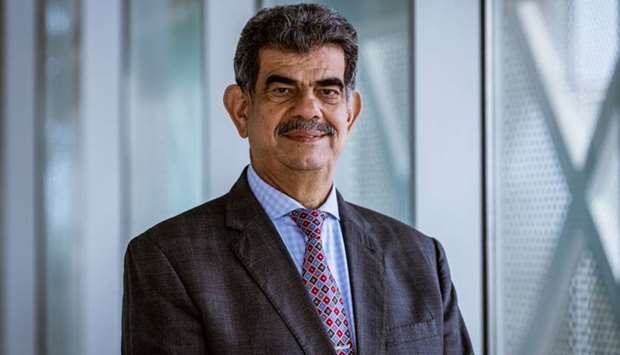*QNRF to launch second cycle food security to address production challenges
In a major bid to ensure food security and combat epidemics, Qatar National Research Fund (QNRF), a member of Qatar Foundation, in collaboration with the Ministry of Municipality and Environment (MME) will soon announce the second cycle of “Food Security Call” in four priority areas for the country.
“The new cycle aims to boost local food production in the priority areas, such as local supply chain; technology to accelerate the development of highly productive and healthy animals, including combating epidemic diseases; technology to accelerate local production of high-quality vegetables; and sustainable aquaculture,” Dr Abdul Sattar al-Taie, executive director, QNRF, told Gulf Times.
QNRF had launched the first cycle of this joint call in collaboration with the MME in 2019 to address the grand challenge of food security in Qatar.
“We discussed the topics of research at length with Dr Faleh al-Thani, Assistant Undersecretary of Agriculture and Fisheries Affairs, and other experts at the MME and agreed that the second cycle of our joint call should be more focused on specific themes that address the pillars of local food production of Qatar National Food Security Strategy (QNFS),” explained Dr al-Taie.
“QNRF runs a diverse and rich portfolio of funding programmes which falls under three main suites: competitive funding research programmes, capacity building programmes, and research connection programmes, all of which are run strictly on competitive basis to ensure quality and equal opportunity,” Dr al-Taie noted.
“In order to address the grand challenge of food security, QNRF launched a special call under TGRP (Thematic and Grand Challenges Research Programme) in collaboration with MME in 2019. This call invited researchers in Qatar and abroad to address one of the main focus areas of QNFS namely; local food production with special emphasis on strengthening resilience among people and agrifood systems, supply chain, policy and legislation, and community initiative,” the official said.
He said that in the first cycle of the food security call, QNRF received 48 proposals. “A total of 46 of them were proceeded through our stringent two-tier evaluation process. Out of these, nine proposals were awarded after a competitive review process. Five of the awards went to researchers at Qatar University, three to Hamad Bin Khalifa University and one to Texas A&M University in Qatar. These winning proposals focused on a multitude of themes including aquaculture, vegetable production, protected agriculture (greenhouse and hydroponics), and the use of advanced technology to enhance local food production,” he revealed.
According to Dr al-Taie, each proposal tackles important aspects of food sustainability in Qatar from several angles.
“In fact, topics such as aquaculture, local food production and the use of advanced technology are perfectly in line with the food security strategy adopted by Qatar in 2018. The idea is to reduce reliance on import and increase dependence on locally produced quality food, making use of state-of-the-art facilities available in Qatar. This ensures sustainability in the long run and eliminates risks related to availability, price fluctuation, supply chain, and geopolitics,” he said.
The official stated that these projects are run mainly by scientists and researchers affiliated to institutions inside Qatar.
“However, some of these projects are also done in collaboration with a number of renowned international organisations and universities. These collaborations are facilitated by the design of the programme as QNRF wanted to give international exposure to local scientists dealing with food security and ensure maximum knowledge transfer and capacity building inside Qatar,” QNRF director highlighted.
“These projects will be running ideally for three years on average. However, we envisage that there will be some tangible results emerging within the first and second year as our researchers are benefiting from excellent infrastructure related to food production,’ added Dr al-Taie.


